The kitchen countertop is key in making your kitchen both functional and beautiful. With many materials, finishes, and prices, picking the right one can be tough. This guide will help you understand what to look for, the good and bad of popular choices, and how to choose the best one for your kitchen.
Ever wondered how some people pick the perfect kitchen countertop easily? It’s all about knowing the unique qualities of each material. From granite’s classic look to quartz’s modern feel, the options are endless. But where do you start?
Key Takeaways
- Explore the pros and cons of popular countertop materials, including granite, quartz, marble, and laminate.
- Discover the importance of factors like durability, maintenance, cost, and climate suitability when making your selection.
- Gain insights into the latest trends and innovative solutions in the world of kitchen countertops.
- Learn how to strike the perfect balance between functionality and aesthetics for your dream kitchen.
- Uncover tips and tricks to ensure your countertop investment stands the test of time.
Understanding Kitchen Countertop Basics
Choosing the right countertop material is key in kitchen design. It affects both looks and function. Each material has its own benefits that can change your kitchen’s look and use.
It’s important to pick the right material. This ensures your countertops look great and work well every day.
Importance of Material Selection
The countertop material you choose greatly impacts your kitchen. Granite and quartz are strong and last long, even with daily use. Marble looks elegant but needs extra care to avoid stains from acidic foods.
Proper care is vital for any countertop. With the right care, they can last 10-20 years or more.
Key Factors in Decision Making
- Durability and scratch resistance
- Ease of cleaning and maintenance
- Heat and stain resistance
- Overall cost, including material and installation
Impact on Kitchen Functionality
The countertop material you choose affects your kitchen’s function. Quartz is easy to clean and maintain. Granite needs sealing but is easy to care for. Marble may stain easily and needs careful cleaning.
The right countertop can make food prep easier. It can also improve your kitchen’s flow and feel.
Popular Natural Stone Options
When choosing kitchen countertops, many turn to granite, marble, and quartzite. Each has its own special qualities and benefits. They meet different design tastes and needs.
Granite is known for being very durable and heat-resistant. It’s a favorite for kitchens that get a lot of use. But, granite needs to be sealed often to keep it stain-free.
Marble is loved for its elegant look and classic style. Its unique patterns add a special touch. Yet, marble can stain and etch easily, so it needs more care than granite.
Quartzite is a mix of marble’s beauty and granite’s toughness. It’s a great choice for those who want a countertop that’s both stylish and strong. Like marble, it needs sealing to avoid stains, but it’s better at resisting scratches and heat.
Every natural stone, from granite to marble and quartzite, has its own upkeep needs and durability. Thinking about these things helps homeowners choose the right countertop for their kitchen.
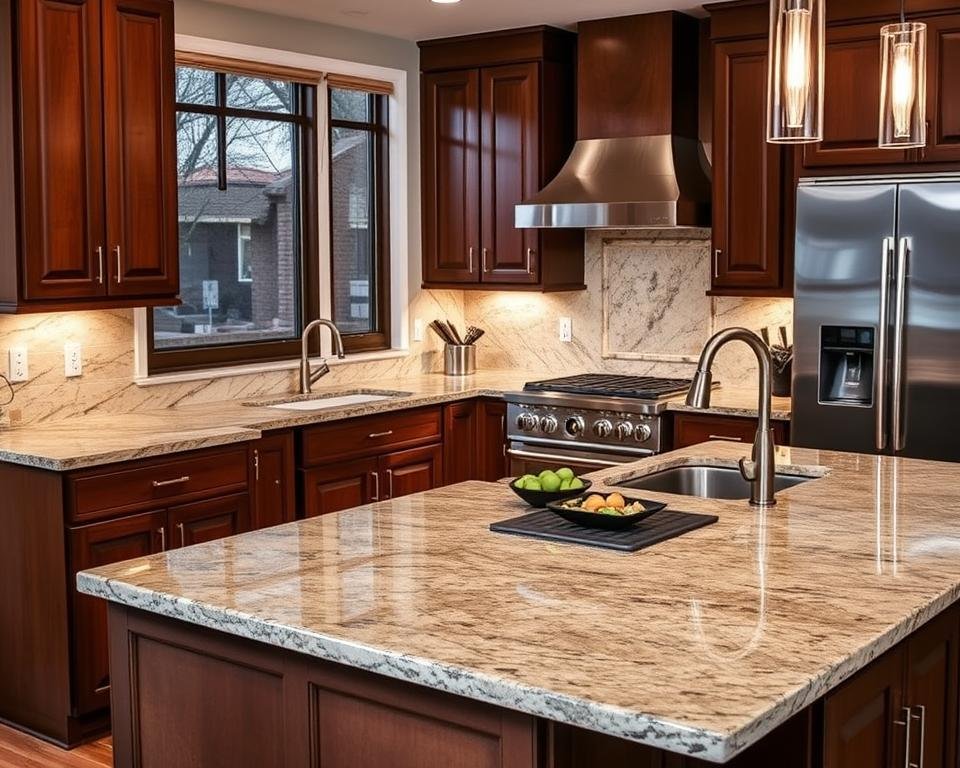
“Granite countertops are a timeless choice that offer unparalleled strength and beauty in the kitchen.”
Engineered Stone Solutions
Kitchen countertops made from engineered stone are durable, easy to care for, and look great. You can choose from quartz composites, solid surface materials, and recycled glass. Each has its own special benefits.
Quartz Composites
Quartz countertops are mostly natural quartz mixed with 10% resins. They are non-porous and won’t stain. Brands like Caesarstone offer many colors and patterns, including ones that look like concrete.
Solid Surface Materials
Solid surface countertops, like Corian, look seamless and can be fixed easily. They can also be shaped to fit unique kitchens and have built-in sinks.
Recycled Glass Options
Recycled glass countertops are good for the planet and look unique. They have a mix of colors and textures that make every kitchen special.
Engineered stone is known for its consistent look, which is why many people choose it. It’s also very durable and easy to keep clean. This makes it perfect for busy kitchens.
| Material | Key Features | Typical Cost (per sq ft) |
|---|---|---|
| Quartz Countertops | Non-porous, stain-resistant, wide range of colors and patterns | $60 – $100 |
| Solid Surface Materials | Seamless appearance, easy repair, custom shapes | $50 – $150 |
| Recycled Glass | Eco-friendly, unique blend of colors and textures | $55 – $125 |
Engineered stone is a smart choice for kitchen countertops. It’s durable, easy to care for, and can be customized to fit any style.
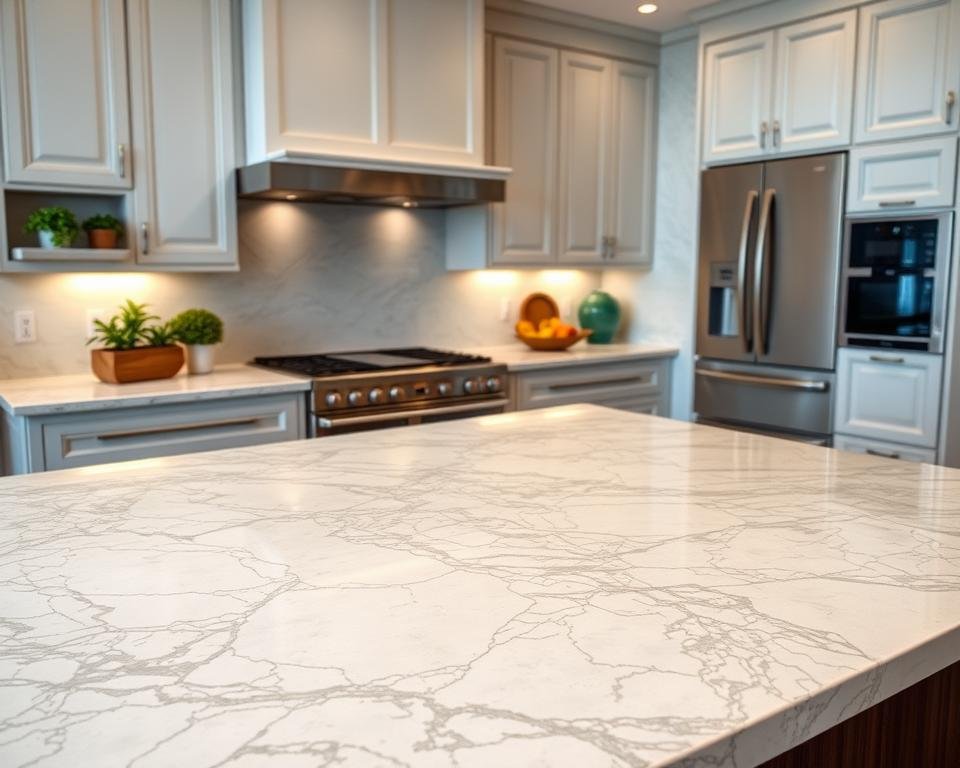
Budget-Friendly Countertop Materials
Choosing the right countertop can greatly affect your kitchen renovation budget. Luckily, there are many affordable options that can make your kitchen look great without costing too much. Laminate countertops and tile countertops are two popular choices for those on a budget.
Laminate countertops come in many colors and patterns. They can mimic the look of expensive materials like granite or marble for much less, starting at $25 per square foot. While they may not last as long as natural stone, they can add a modern touch to your kitchen.
Tile countertops let you create unique designs. Starting at $35 per square foot, they’re a budget-friendly way to refresh your kitchen’s look. But, keep in mind that cleaning the grout lines can be a bit tricky.
Other budget-friendly countertop materials include wooden countertops, concrete, and even contact paper. Each has its own pros and cons. It’s important to think about what you need and what fits your budget before making a choice.
| Countertop Material | Average Starting Price (per sq ft) |
|---|---|
| Laminate | $25 |
| Solid Surface | $35 |
| Granite | $56 |
| Butcher Block | $60 |
| Quartz | $69 |
While these options might not last as long as more expensive materials, they can make your kitchen look and feel new without breaking the bank. With some research and planning, you can find the perfect affordable option for your kitchen.
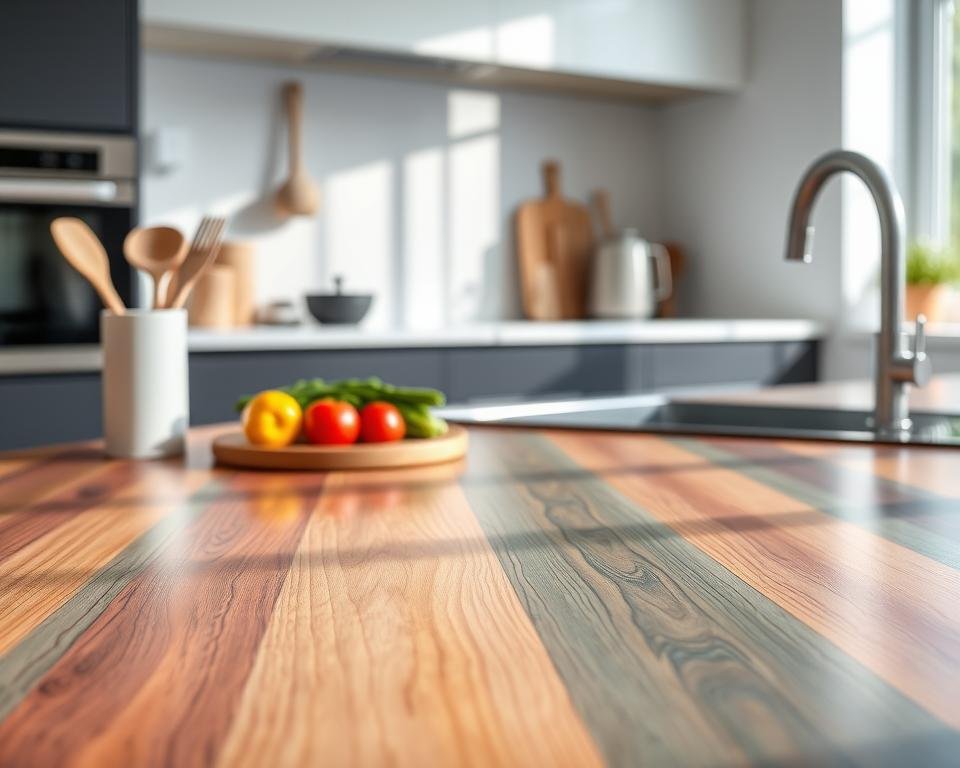
Durability and Maintenance Requirements
Kitchen countertops need to be durable and easy to maintain. Different materials have different hardness, heat resistance, and stain resistance. These factors affect how well they last and how much care they need.
Cleaning Best Practices
To keep your countertops looking great, regular cleaning is key. Quartz and solid surface materials are easy to clean with just a mild detergent and a damp cloth. On the other hand, natural stones like granite and marble need special care. Use pH-neutral cleaners and clean spills quickly to avoid stains.
Long-term Care Tips
- Granite countertops need to be sealed every year to keep them stain-free and shiny.
- Quartz countertops are very low maintenance. They’re non-porous and don’t need sealing.
- Soapstone is also non-porous and doesn’t need sealing. It’s good at resisting stains and heat.
- Marble countertops are more delicate. They need to be sealed often to prevent stains and etching.
Prevention of Damage
To keep your countertops in good shape, take preventive steps. Use cutting boards and trivets, and clean spills right away. This is important for surfaces like natural stone.
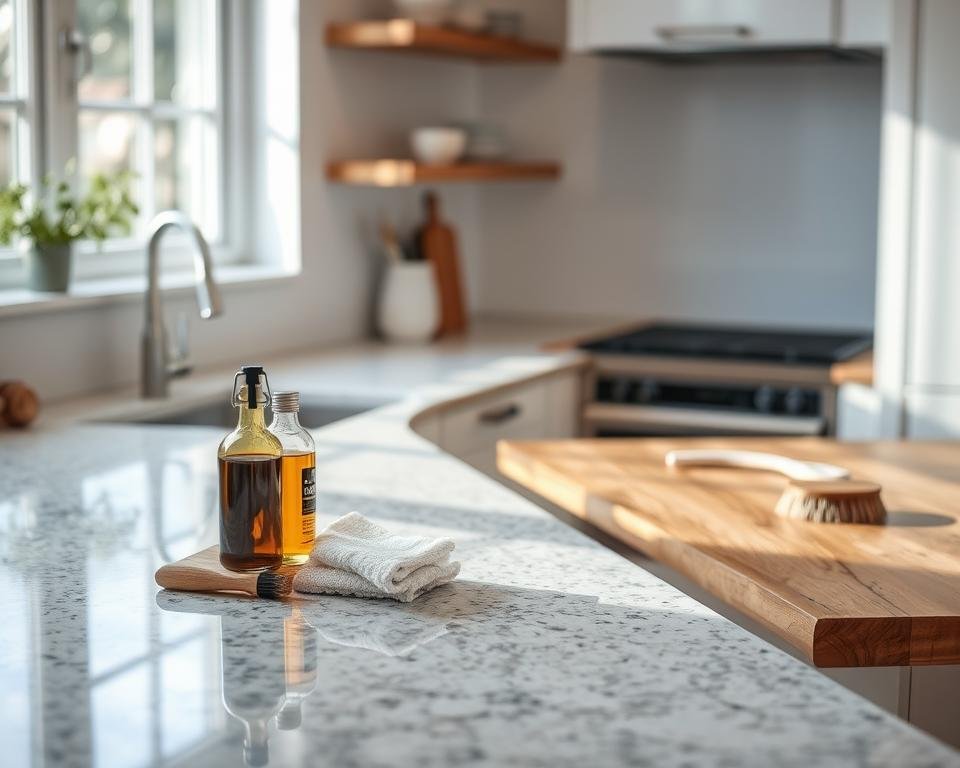
“A durable countertop with lower maintenance requirements is easier to care for and has a longer lifespan.”
Knowing how to care for different countertop materials helps keep your kitchen looking great for years. Follow the best practices for your countertop type to ensure they stay in top condition.
Countertop Choices and Design Aesthetics
The countertop material greatly affects the kitchen’s look. Natural stones like granite and marble bring unique patterns. Engineered materials, like quartz, offer a modern look that fits many styles.
Choosing the right countertop color is key. Light colors make small kitchens feel bigger. Darker shades add drama to larger kitchens. Make sure the countertop color matches your cabinets and flooring for a cohesive look.
Edge profiles and textures also play a big role. Different edges can give your kitchen a classic or modern vibe. Textures like honed or textured finishes add depth and interest. Trying out different options can help you create a kitchen that’s truly yours.
| Countertop Material | Design Aesthetic | Key Considerations |
|---|---|---|
| Granite | Unique, natural patterns | Durable, requires sealing |
| Quartz | Consistent, contemporary | Highly durable, low maintenance |
| Marble | Elegant, luxurious | Prone to staining, requires regular sealing |
| Laminate | Affordable, versatile | Less heat and scratch-resistant |
| Concrete | Modern, customizable | Requires sealing, prone to cracking |
Choosing the right countertop material, color, and design can make your kitchen both functional and stylish. It shows off your personal taste and enhances the kitchen’s look.
“The countertop is the heart of the kitchen, where function and style come together to create a space that is both practical and visually appealing.”
Heat and Stain Resistance Comparison
Choosing kitchen countertops means looking at heat and stain resistance. Not all materials handle heat and stains well.
Temperature Tolerance Levels
Granite and quartzite can handle hot pans and pots without damage. Quartz and laminate might get damaged by heat, showing discoloration or white spots. Solid surfaces like Corian and Avonite can also handle heat but might need repair if damaged.
Stain Prevention Methods
Granite and quartzite need sealing to stay stain-free. Quartz and solid surfaces don’t need sealing because they’re non-porous. Always clean spills quickly and use the right cleaning products to avoid stains.
| Countertop Material | Heat Resistance | Stain Resistance |
|---|---|---|
| Granite | Excellent | Good (requires sealing) |
| Quartzite | Excellent | Good (requires sealing) |
| Quartz | Good | Excellent |
| Solid Surface (Corian, Avonite) | Excellent | Excellent |
| Laminate | Fair | Good |
Knowing how different countertops handle heat and stains helps you choose wisely. This ensures your kitchen stays beautiful and easy to maintain for years.
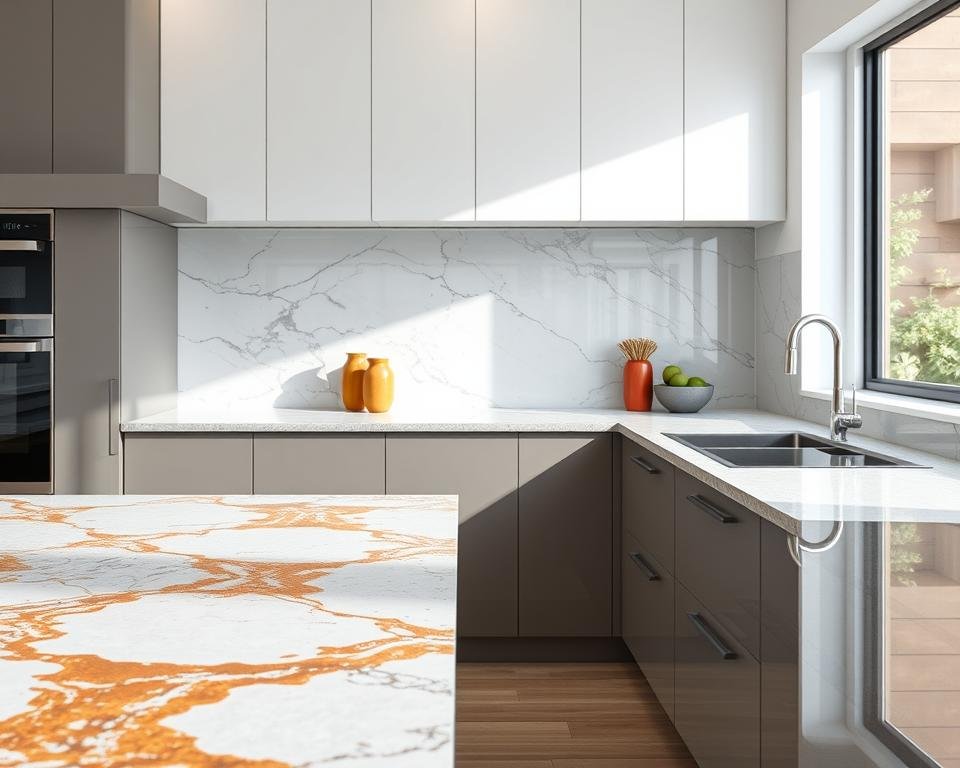
Installation Considerations and Costs
When updating your kitchen with new countertops, think about the installation and costs. The type of material you pick affects the installation’s complexity and cost.
Materials like granite and marble need a pro for their weight and special cuts. They cost $60 to $200 per square foot. Laminate, being lighter, is easier to install yourself and costs $20 to $30 per square foot.
Seamless installation is key. Quartz and engineered stone offer a smooth finish. Natural stones might need seams. Edge profiles also affect costs, with simple edges being cheaper, at $10 to $30 per foot.
Plan your budget for materials, removing old countertops, and labor. Upgrading can cost $2,500 to $3,500. For high-end or custom, expect to spend over $10,000.
| Countertop Material | Cost per Square Foot (Installed) |
|---|---|
| Granite | $60 – $200 |
| Quartz | $70 – $120 |
| Laminate | $20 – $30 |
| Butcher Block | $50 – $75 |
| Concrete | $70 – $105 |
| Tile | $40 – $80 |
Knowing the costs and considerations helps you choose wisely. Whether you go for a countertop installation or a DIY option, it should fit your budget and design dreams.
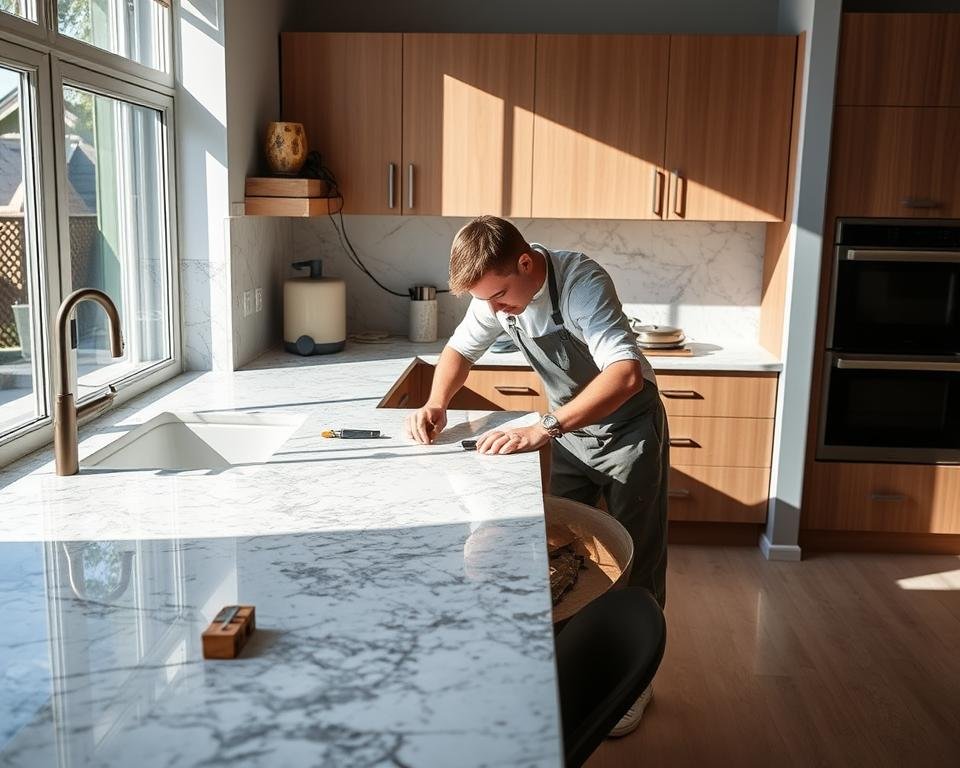
Eco-Friendly Countertop Options
Choosing the right countertop is key to a green kitchen. Options like recycled glass, bamboo, and some engineered stones are better for the planet. They often use recycled materials or renewable resources.
Sustainable Materials
Many companies are now focusing on being green. For example, Silestone’s Sunlit Days collection uses 99% reused water and 100% renewable energy. Dekton’s surfaces are carbon-neutral, made with glass, quartz, and porcelain.
Teragren’s bamboo countertops are even carbon-negative during production. Other choices include PaperStone, made from recycled paper and a non-petroleum resin, and Richlite, from recycled paper and resin. These are durable and water-resistant, yet eco-friendly.
Environmental Impact
Choosing an eco-friendly countertop means looking at its whole life cycle. Some natural stones, like granite, can release radon if not sealed. Engineered and recycled materials are safer choices.
Top brands are now making eco-friendly products. By picking sustainable kitchen materials, you help the planet and make your kitchen greener.
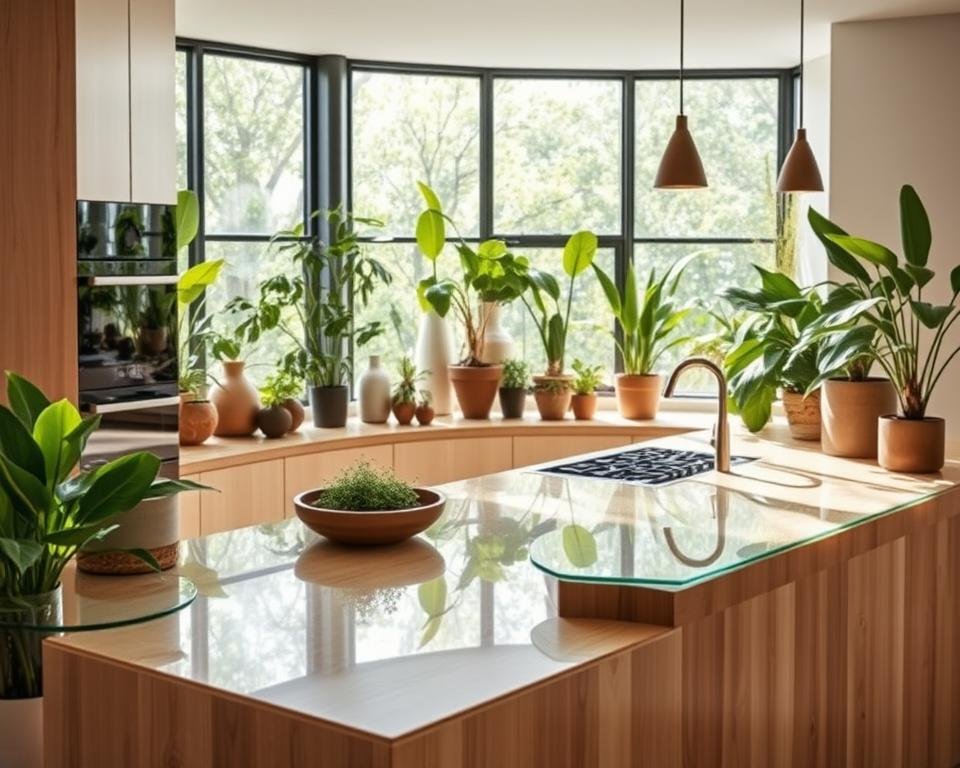
Color and Pattern Selection Guide
Choosing colors and patterns for kitchen countertops greatly affects the look and feel of your space. Whether you pick natural stone, engineered materials, or something more affordable, knowing about color and pattern options is key. It helps in making a kitchen that truly shows off your style.
Natural stone countertops, like granite and marble, have unique patterns. These can range from soft veining to bold swirls. These patterns add character and can make your kitchen look bigger and brighter. Studies show that lighter-colored countertops can make a small kitchen look bigger and brighter.
Engineered stone, such as quartz, offers a consistent color palette. This makes it easy to create a seamless look. These materials come in bold patterns or neutral tones that match well with many kitchen styles.
Design trends show a mix of bold patterns and classic colors. About 60% of homeowners choose warm, earthy tones or neutral shades like white, gray, and beige. These colors can increase your home’s value. But, 40% prefer vibrant colors or detailed patterns, perfect for modern kitchens.
It’s important to think about how your countertop will look with the rest of your kitchen. Talking to design experts or using online tools can help. This ensures your kitchen looks great and works well.
Balancing Color and Contrast
Choosing countertop colors needs a balance. You want a cohesive look but also a focal point. For example, light cabinets with a dark countertop can make your kitchen more interesting. A light countertop with dark cabinets can brighten the room and make it feel more open.
The color and pattern of your countertop can also affect your kitchen’s feel. Studies show that 75% of homeowners with light countertops feel their kitchen is more spacious and bright, even in small rooms. Dark or patterned countertops can make your kitchen feel cozy but might seem smaller.
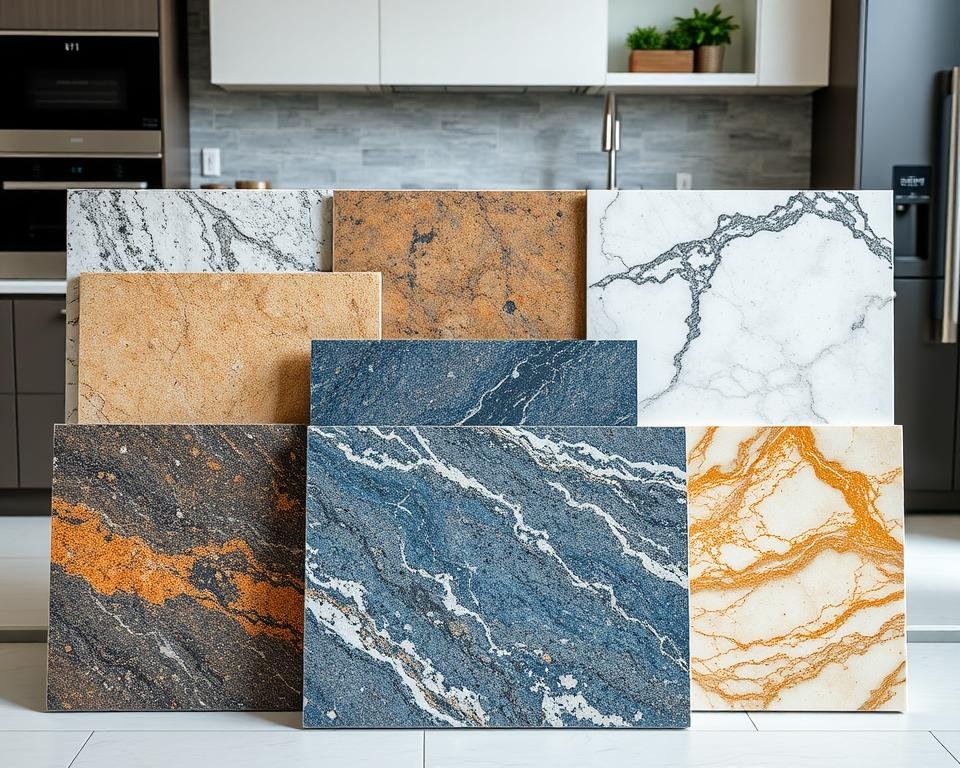
Choosing your countertop color and pattern should match your style and kitchen design. By thinking about these things, you can make a kitchen that looks amazing and works well for you.
Professional vs. DIY Installation
Choosing new countertops for your kitchen comes down to two paths: professional installation or DIY. Each choice has its own benefits and things to think about. Let’s look at the main differences to help you decide.
The Benefits of Professional Countertop Installation
Going with a pro for countertop installation has many pluses. Experts have the skills, training, and tools needed for heavy materials like granite. They make sure your countertops fit perfectly and are level, avoiding costly mistakes.
Professional jobs also come with warranties. This gives you peace of mind and protection for both the work and materials. It’s great for complex projects or designs that need precise work.
The Appeal of DIY Countertop Installation
DIY countertop installation is appealing for those watching their budget. Doing it yourself can save on labor costs, a big part of the total cost. But, it takes time, special tools, and there’s a risk of mistakes that could cost more later.
DIY might work for lighter materials like laminate. But, for heavier materials like granite or quartz, you really need a pro. They have the right skills and tools for a job well done.
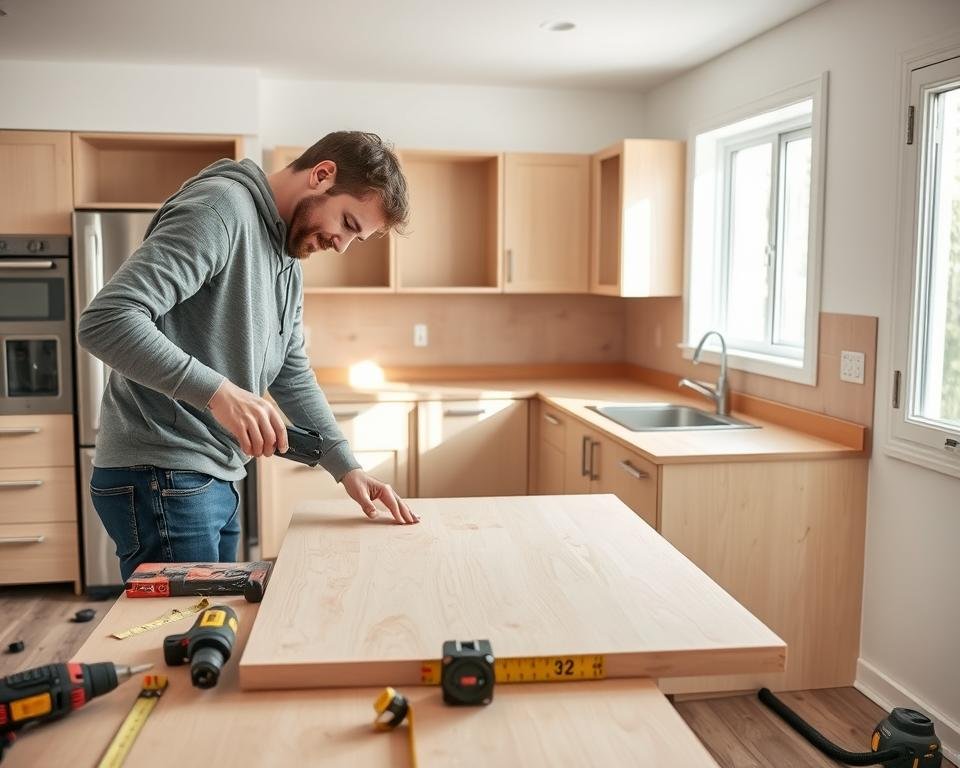
In the end, your choice between professional or DIY installation depends on your needs, budget, and comfort with the project. DIY can save money, but professional installation means quality work, quick completion, and warranties to safeguard your investment.
Longevity and Value Addition
Kitchen countertops play a big role in your kitchen’s look and feel. The material you choose affects how long they last. This, in turn, impacts your kitchen’s value over time.
Granite countertops can last decades with the right care. They’re tough and keep looking great for years. On the other hand, laminate countertops don’t last as long but are cheaper. New laminate looks more like expensive materials, making it a good choice for those on a budget.
Quartz countertops are a great mix of long life and value. They’re known for their countertop lifespan and look, boosting your kitchen value.
Think about the cost and how long a countertop will last when choosing. Even though granite and quartz are pricier, they’re worth it. They last a long time and keep your kitchen looking good, increasing your home’s value.
| Countertop Material | Lifespan | Cost Range (per sq ft) |
|---|---|---|
| Granite | over 100 years | $40 – $200 |
| Quartz | over 100 years | $50 – $200 |
| Tile | around 100 years | $10 – $50 |
| Wood | around 100 years | $40 – $100 |
| Concrete | 50 years | $70 – $150 |
| Laminate | shorter lifespan | $10 – $40 |
Choosing the right countertop material is key to a lasting kitchen investment. It ensures your kitchen stays beautiful and functional for years.
Modern Trends in Kitchen Countertops
Kitchen countertops are always changing, with new designs, materials, and finishes catching everyone’s eye. Large slabs reduce seams, while matte and textured finishes add depth. These trends are changing how we see and use countertops.
Sustainable and recycled materials are becoming more popular as people care more about the environment. Quartz, a durable and easy-to-clean engineered stone, is a favorite. Also, wireless charging stations are being added, combining tech and design.
Bold colors and patterns are back, unlike the old neutral tones. Dramatic veining and terrazzo-inspired designs bring life to kitchens. Mixing different materials and textures is also popular, making kitchens unique.
Even though new trends are here, classic materials like granite and natural stone are also loved. They offer beauty and strength. Today, there are many ways to make a kitchen both stylish and functional.
| Trend | Description |
|---|---|
| Large-format Slabs | Minimizing seams for a seamless, modern look |
| Matte and Textured Finishes | Adding depth and character to countertops |
| Sustainable and Recycled Materials | Eco-friendly options like quartz composites |
| Integrated Wireless Charging | Blending technology and design in the kitchen |
| Bold Colors and Patterns | Dramatic veining, warm-toned marbles, and terrazzo |
| Mixed Materials | Blending textures and finishes for personalized designs |
Homeowners and designers are always exploring new ideas for kitchens. The latest countertop trends mix function, green living, and creativity. With new finishes and materials, kitchens are becoming personal canvases for everyone’s style.
“The kitchen countertop is the heart of the home, and the latest trends are redefining the way we interact with this essential design element.”
Conclusion
Choosing the right kitchen countertop is a big decision. You need to think about looks, function, cost, and upkeep. It’s key to consider your lifestyle and cooking habits when picking a countertop for your kitchen renovation.
By trying out different materials and talking to experts, you can make a smart countertop decision. This choice can make your kitchen look better and work better. It might even increase your home’s value.
Whether you like the classic look of granite or the easy care of engineered quartz, the right countertop can change your kitchen. Knowing what each material needs can help you pick the best one for you. This way, your kitchen will be both beautiful and useful for years.
The choice of countertop is all about your personal taste, budget, and upkeep needs. By looking at all your options and getting advice, you can find the perfect countertop. It will make your dream kitchen come true.
FAQ
What are the most popular kitchen countertop materials?
The top choices for kitchen countertops are granite, quartz, marble, laminate, solid surface, and butcher block.
What factors should I consider when choosing a kitchen countertop?
Think about durability, upkeep, cost, and how well they handle your climate. Also, consider their heat and stain resistance, how hard they are to install, and how they look.
How do natural stone countertops like granite and marble compare?
Granite is great at resisting heat and scratches but needs sealing now and then. Marble is elegant but can etch and stain easily. Quartzite is a mix of marble’s beauty and granite’s toughness.
What are the benefits of engineered stone countertops like quartz?
Engineered stones, like quartz, are durable, easy to care for, and have consistent looks and colors. They’re better than natural stones in these ways.
What are some budget-friendly countertop options?
If you’re on a tight budget, consider laminate or tile countertops. They’re not as durable as stone but can make your kitchen look new without breaking the bank.
How do I maintain different types of countertops?
The upkeep varies by material. Quartz and solid surfaces are easy to keep up with. But, natural stones like granite and marble need sealing often. Cleaning methods also differ.
How do countertop choices affect kitchen design?
The countertops you choose really shape your kitchen’s look. Natural stones bring unique patterns, while engineered materials offer consistent designs. Pick colors and edges that match your kitchen’s style.
How do I compare heat and stain resistance of different countertop materials?
Granite and quartzite handle heat well, but quartz and laminate are more sensitive. Natural stones can stain if not sealed, while quartz and solid surfaces resist stains.
What are the installation considerations for different countertop materials?
The difficulty and cost of installation vary by material. Granite and marble are heavy and need pros, but laminate is lighter and DIY-friendly. Solid surfaces offer a seamless look.
Are there any eco-friendly countertop options available?
Yes, there are eco-friendly options like recycled glass, bamboo, and some engineered stones made from recycled or sustainable materials.


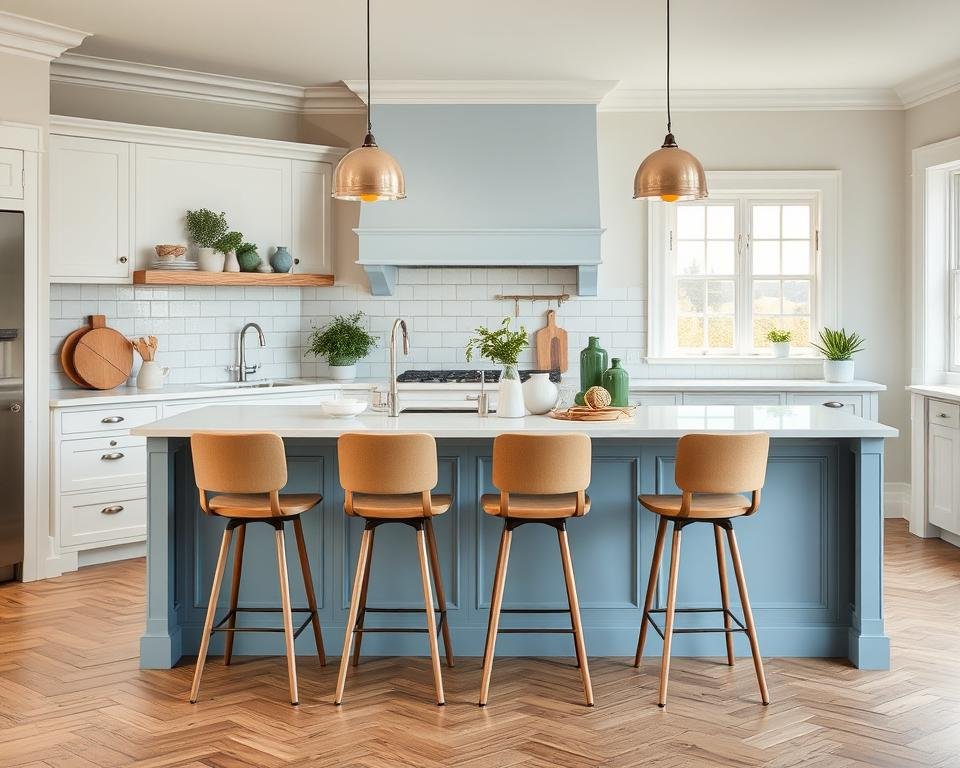


Leave a Comment